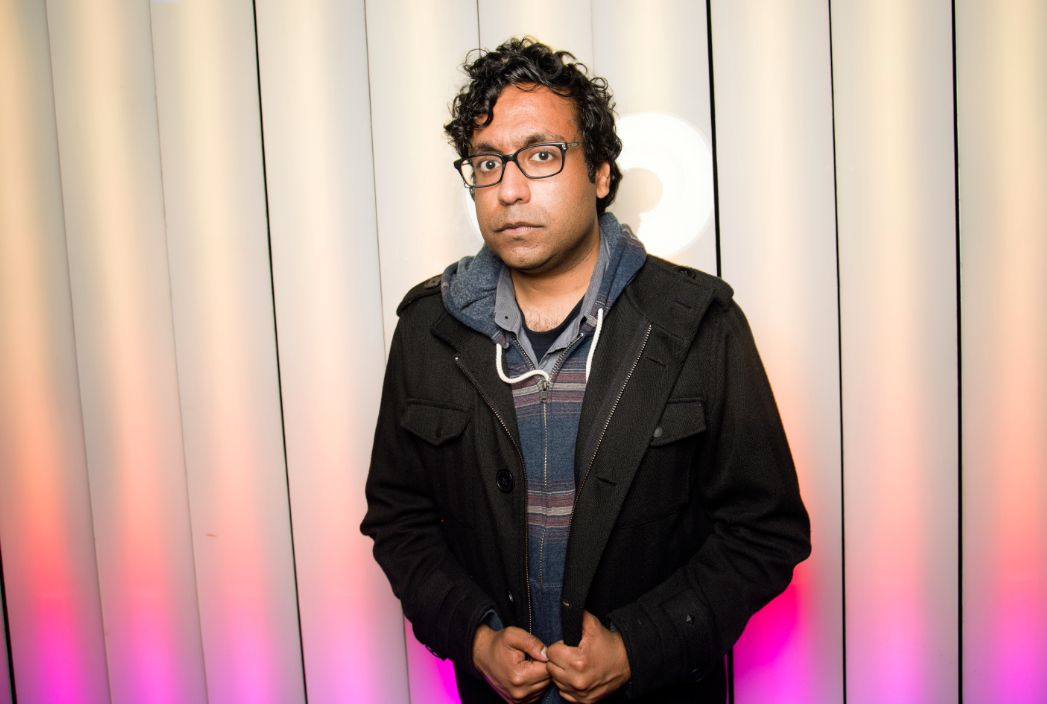On a previous trip to Asheville, comedian Hari Kondabolu says, “It was incredible … before the show wandering around thrift stores, drinking good coffee and seeing the mountains. [Then] doing the gig and feeling like people got it.” He continues, “It feels like a home game. I have a bunch of folks who I don’t have to explain as much to and who are excited that I’m there.”
Plus, during his interview with Xpress, it was snowing in Brooklyn, where Kondabolu is based. So even if the comedian’s upcoming Sunday, March 3, show at The Orange Peel doesn’t fall squarely within spring, it’s likely to be a welcome reprieve, weatherwise.
The Indian-American stand-up gained notoriety in 2017 with his documentary The Problem with Apu in which he discussed the stereotyped namesake “Simpsons” character — an Indian convenience store owner voiced by white actor Hank Azaria — with other South Asian-American entertainers such as Aziz Ansari, Kal Penn and Maulik Pancholy.
More recently, Kondabolu has been a regular panelist on the popular NPR program “Wait Wait … Don’t Tell Me!” He describes the show as a gift, adding, “I always feel I’m one of the slower ones. … After a while, I had to tell myself, ‘There is no slower one.’ Everyone brings a different thing to the table and a different style. … The fact that so many people come to see me because of that show always surprises me.” His favorite part, Kondabolu says, is writing the fake news reports for the “Bluff the Listener” segment.
But, he points out, having an NPR fan base means his crowds — while often well-informed — can skew a little whiter and a little older.
Then again, Kondabolu says his jokes haven’t changed much since the 2016 presidential election — he’s always been up on current events and vigilantly pointing out racism and prejudice; he co-hosted the podcast “Politically Re-Active” with his friend W. Kamau Bell from June 2016 to October 2017. How his material is received, however, is different. “Trump makes it so blatant,” says the comedian. “Now, when I talk about racism, I have this real-life example. … It becomes this thing where I have to prove less.”
He continues, “For years, I felt like Chicken Little, and now, all of a sudden, people are like, ‘The sky fell. He was right. The sky actually fell.’”
In general, Kondabolu finds his audiences are more on board with his smart, political brand of humor — though each performance is different and crowds vary from city to city. “A late show on a Friday and then an early show on a Thursday: People have different mindsets,” he explains.
Still, “the culture has changed,” he says. “Outside of Trump … there are more examples of people speaking out, and the internet has exposed people to a broader range of opinions. That immediately makes for a better audience.”
Kondabolu’s debut comedy album, Waiting for 2042 (referencing the year when, according to the census, minorities will outnumber whites in the U.S.) made Best of 2014 lists and his follow-up, Mainstream American Comic went to No. 1 on Amazon and iTunes. He’s appeared on broadcasts such as “Fresh Air with Terry Gross” and “All Things Considered,” as well as podcasts including “WTF with Marc Maron” and “2 Dope Queens.” His comedy special, “Warn Your Relatives,” premiered last year.
That program, on Netflix, addresses issues such as LGBT rights, health care, terrorism and his family — Kondabolu’s parents are immigrants from India. “I don’t think anything is off-limits,” he says of his material. “But sometimes, when there’s personal stuff that’s really raw, it’s hard to make jokes.”
The audience senses a comedian’s discomfort, he explains. “Confidence is such a big part of this.”
But, as he’s grown in his art form, there are fewer topics he avoids onstage. “In terms of talking about family, I was afraid I was going to be judged. ‘Oh, he’s talking about his immigrant parents. That’s so typical and easy.’ That prevented me from exploring that really rich ground.” But then, after some thought, he realized, “There are tons of white comics who talk about their parents because those are their parents, and that’s such a foundational thing.”
Ultimately, Kondabolu says, he realized he didn’t need to care what anyone else thought. “It comes down to, is the stuff original, is it personal and honest, and is it funny?” he says.
As he grows and matures as a person, Kondabolu says, his material gets more interesting. Stand-up comedy, he’s found, offers limitless possibilities for honing his art form. “I’m discovering all the time that I can take a risk. … I don’t need a laugh a minute,” he says. “For years, I didn’t do faces or impressions. But there are all sorts of things you can do.”
Kondabolu adds, “That’s what I love about stand-up — it’s without boundary. The fourth wall regularly comes down.”
WHO: Hari Kondabolu
WHERE: The Orange Peel, 101 Biltmore Ave., theorangepeel.net
WHEN: Sunday, March 3, 8 p.m. $25 advance/$28 day of show




Ok, got it, orange man bad, supporters are “racist” Yadda, yadda. My biggest crush in High School was a first generation American of Indian parents, she was amazing. This partisan Democrat… not so much.